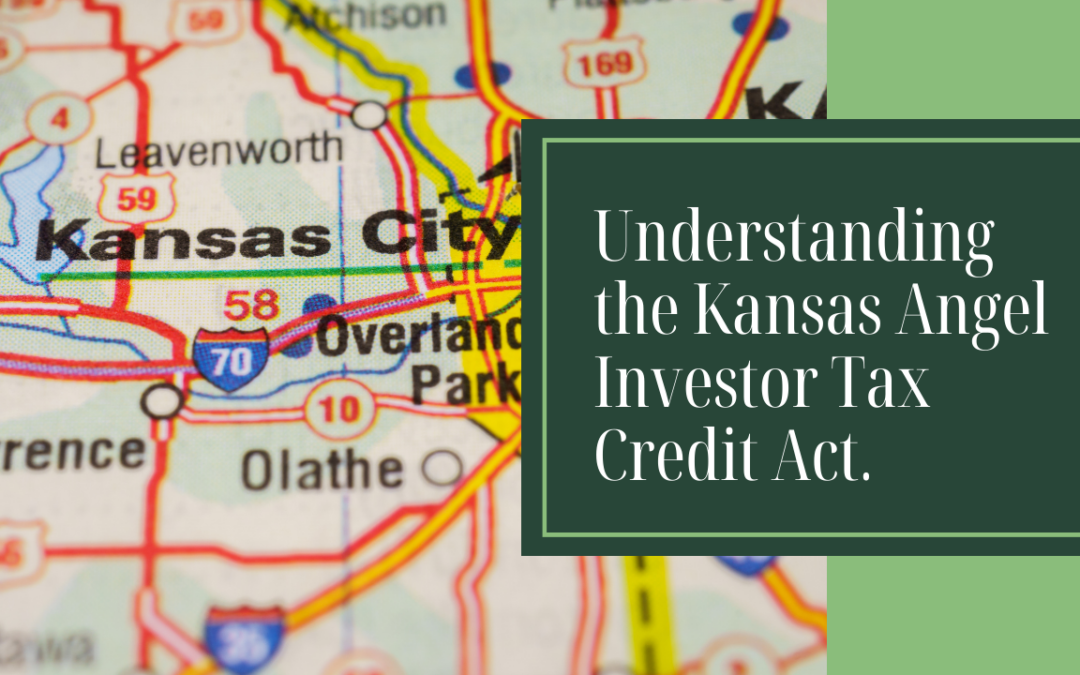What is it?
The Kansas Angel Investor Tax Credit Act, or KAITC, is a State administered initiative offering tax credit to qualified investors for the purpose of stimulating and growing small businesses. Specifically, the KAITC targets “businesses engaged in the development, implementation and commercialization of innovative technologies, products and services.” By offering this tax credit act, Kansas hopes to strengthen small businesses which it deems as “job and wealth creating enterprises.” K.S.A. § 74-8131. If an investor and a business individually qualify for the KAITC, then the growing business will receive an investor and the seed capital to develop and mature, while the investor gets the opportunity for a tax credit and future potential profits from their investment. The State of Kansas, while losing a portion of its owed taxes, will eventually gain greater compensation from the success of growing new businesses.
What is an Angel Investor?
An Angel Investor is “an accredited investor” that is a natural person or an owner of a permitted entity investor, who is of high net worth. For individuals this would be a net value of $1,000,000 or an individual income of over $200,000 a year. 17 C.F.R. § 230.501(a) further details the requirements of entities such as banks, investment companies, trusts, and family office.
What businesses are eligible?
All businesses who seek investments under KAITC, must be approved by the State Secretary and meet the following requirements: (1) The business has a reasonable chance of success; (2) the business has the reasonable potential to create measurable employment within the state; (3) the business has an innovative and proprietary technology, product and service; (4) the existing owners of the business and other founders have made or are committed to make a substantial financial and time commitment to the business; (5) the securities to be issued and purchased are qualified securities; and (6) binding commitments have been made by the business to the department for adequate reporting of financial data, including a requirement for an annual report, or, if required by the secretary, an annual audit of the financial and operational records of the business, the right of access to the financial records of the business and the right of the department to record and publish normal and customary data and information related to the issuance of tax credits that are not otherwise determined to be trade or business secrets. K.S.A. § 74-8135(a).
Who is not eligible?
Not every small business is eligible. Kansas legislature lays out factors that will bar a small business from qualifying: (1) The business must not have had annual gross revenues of more than $ 5,000,000 in the most recent tax year of the business; (2) businesses that are not bioscience businesses must have been in operation for less than five years; bioscience businesses must have been in operation for less than 10 years; (3) all else equal, first consideration will be given to animal health companies; (4) the business must not have ownership interests including, but not limited to, common or preferred shares of stock that can be traded by the public via a stock exchange, electronic exchange, bulletin board or other public market place on or before the date that a qualifying investment is made; (5) the business must not be engaged primarily in any one or more of the following enterprises: (A) Any service provider set forth in K.S.A. 17-2707, and amendments thereto; (B) the business of banking, savings and loan or lending institutions, credit or finance, or financial brokerage or investments; (C) the provision of professional services, such as legal, accounting or engineering services; (D) governmental, charitable, religious or trade organizations; (E) the ownership, development, brokerage, sales or leasing of real estate; (F) insurance; (G) construction or construction management or contracting; (H) business consulting or brokerage; (I) any business engaged primarily as a passive business, having irregular or noncontinuous operations, or deriving substantially all of the income of the business from passive investments that generate interest, dividends, royalties, or capital gains, or any business arrangements the effect of which is to immunize an investor from risk of loss; (J) any Kansas certified capital formation company; (K) any activity that is in violation of the law; and (L) any business raising money primarily to purchase real estate, land or fixtures; and (6) the business must satisfy all other requirements of this act. K.S.A. § 74-8134(c).
Is that all?
There’s a little more. Before an angel investor is qualified to receive their tax credit, they must make a cash investment in a qualified Kansas business.
How does a Kansas business get qualified?
A small business has to make an application to the State Secretary with the following requirements: (1) The name of the business and certified copies of the organizational documents of the business; (2) a business plan, including a description of the business and the management, product, market and financial plan of business; (3) a statement of the business innovative and proprietary technology, product or service; (4) a statement of the potential economic impact of the enterprise, including the number, location and types of jobs expected to be created; (5) a description of the qualified securities to be issued, the consideration to be paid for the qualified securities, the amount of any tax credits requested and the earliest year in which the tax credits may be redeemed; (6) a statement of the amount, timing and projected use of the proceeds to be raised from the proposed sale of qualified securities; and (7) such other information as the secretary may request, such as the names, addresses and taxpayer identification numbers of all investors who may qualify for the tax credit. Such list of investors who may qualify for the tax credits shall be amended as new qualified securities are sold or as any information on the list shall change. K.S.A. § 74-8134(b).

